One of Google’s most iconic features is facing an uncertain future. The “I’m Feeling Lucky” button, which has been part of Google’s search interface since shortly after the company’s founding around 1998, may soon disappear as Google shifts toward AI-powered search experiences.
The button was designed to save users time by taking them directly to the top-ranked search result, bypassing the standard results page. In its early days, this feature helped differentiate Google from other search engines and became a symbol of the company’s playful, user-friendly approach.
Google’s “I’m Feeling Lucky” button embodied efficiency and whimsy, defining the company’s distinctive character in the early search engine landscape.
For many years, the button served as both a practical tool and an internet Easter egg. Users who clicked it sometimes landed on unexpected or entertaining destinations. This unpredictability made it a favorite among early internet users and contributed to Google’s approachable brand identity.
However, usage of the “I’m Feeling Lucky” button has declined considerably in recent years. The rise of mobile search, enhanced result previews, and instant answers have reduced the need for this shortcut. Today’s users expect immediate, in-line answers rather than being redirected to a single website. Despite accounting for less than 1% of total Google searches, the button remains preserved for branding and nostalgic reasons.
Google’s new AI Mode, currently available to select U.S. users, represents a fundamental shift in how people interact with search. This change moves away from the original concept that demonstrated Google’s confidence in its algorithm when the button was first introduced in 1998. Instead of jumping to a top result, AI-powered search offers summarized or synthesized answers with multi-step reasoning and context awareness. The shift mirrors broader industry trends, with multimodal AI now integrating text, audio, and visual inputs for more comprehensive understanding.
Critics argue the button has become anachronistic in today’s search environment. Some note that bypassing search results can lead users to outdated or irrelevant pages. Others believe preserving this piece of digital history is important for nostalgic reasons.
Though no official timeline has been announced for the button’s complete retirement, its role continues to diminish as Google invests heavily in AI technologies. For longtime internet users who remember the novelty of early Google, the potential loss of this quirky feature marks the end of an era.
References
- https://invoidea.com/blog/what-im-feeling-lucky-is-on-google
- https://www.trillmag.com/news/tech/im-feeling-lucky-button/
- https://scientyficworld.org/google-im-feeling-lucky-button/
- https://vgtimes.com/news/126136-google-may-retire-im-feeling-lucky-button-ai-powered-search-takes-center-stage.html
- https://www.mymobileindia.com/the-story-behind-googles-im-feeling-lucky-button/









